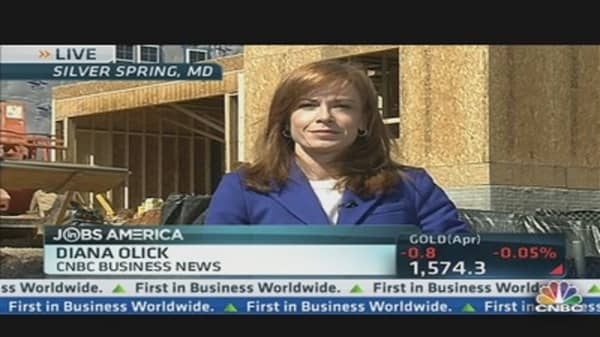After lagging housing starts for several months, construction jobs surged in February to the highest level in six years. Builders are clearly acting on the big jump in new home orders, but those jobs numbers could actually be higher, were they not hamstrung by a severe lack of workers. During the housing crash construction workers left the business in droves, and many are not coming back.
"One of the reasons is because they are not paying well yet," said Lisa Marquis Jackson, an analyst with John Burns Real Estate Consulting. "The wages were cut so much in the downturn, so until those prices get back to where they are attractive, the labor is not going to be attracted back to the industry.
Housing starts are up 24 percent from a year ago, but residential construction employment is up only 3.1 percent, according to the U.S. Commerce and Labor Departments. Former construction workers headed to higher paying jobs, such as the trucking industry. Some in the Southwest headed north to the newly thriving energy sector, said Marquis Jackson. Others headed to highway construction jobs in Texas.
(Read More: Job Creation Surges as Rate Falls to 7.7%)
In Las Vegas, where Pardee Homes is building 150 percent more homes this year than they did last year, finding workers is increasingly difficult.
"We lost quite a bit of labor to the oil fields and to places like Wyoming and North Dakota, where you would not expect it to go," noted Klif Andrews, Pardee's Las Vegas president.
Andrews said he is paying workers five to ten percent more now, and that has pushed his home prices higher. "We've raised median home prices up over 15 percent, so we've been able to stay a little bit ahead of it, but cost increases, it's not just labor, it's also materials," he added.
Nationwide, the median price for newly built homes rose 2 percent in January and new home prices now far exceed the median price for existing homes.
(Read More: Housing: Picking Up the Pieces)
Another factor is weighing on workers. Contractors, who hire the specialty workers for builders, are small businessmen themselves. In order to fund their operations, they need to hire people to have ready, and that takes capital. Unfortunately, despite the housing recovery, banks are still not lending freely to builders. Builders are trying to find ways around that, by paying subcontractors more frequently, essentially bankrolling them so they can hire more workers.
"The wheels are starting to work, but all the gears are not working in alignment," said Marquis Jackson.
Total employment in construction increased by 48,000 in February. Since September, construction employment has risen by 151,000. The biggest growth in February construction jobs came in residential specialty trade contractors, up 17,000. Those trades, such as plumbers, painters, and electricians, have been boosted not just by an increase in home construction but in home remodeling as well. It is still not enough.
It is now taking 15 percent longer to complete a home from start to finish nationally, according to John Burns Real Estate Consulting. Out West, where starts are surging back, that delay is far longer, taking 23 percent longer to complete a home than just one year ago.
(Read More: Here's What Is Fueling the Housing Boom in Vegas)
Builders did not anticipate or perhaps did not believe housing would be as strong as it appears to be now. The good news is home building is surging back; the bad news is apparently the builders were not ready.
—By CNBC's Diana Olick; Follow her on Twitter @Diana_Olick or on Facebook at facebook.com/DianaOlickCNBC
Questions? Comments? RealtyCheck@cnbc.com
Correction: An earlier version of this story incorrectly stated that housing starts were up 37% and residential construction employment was up 6%.




